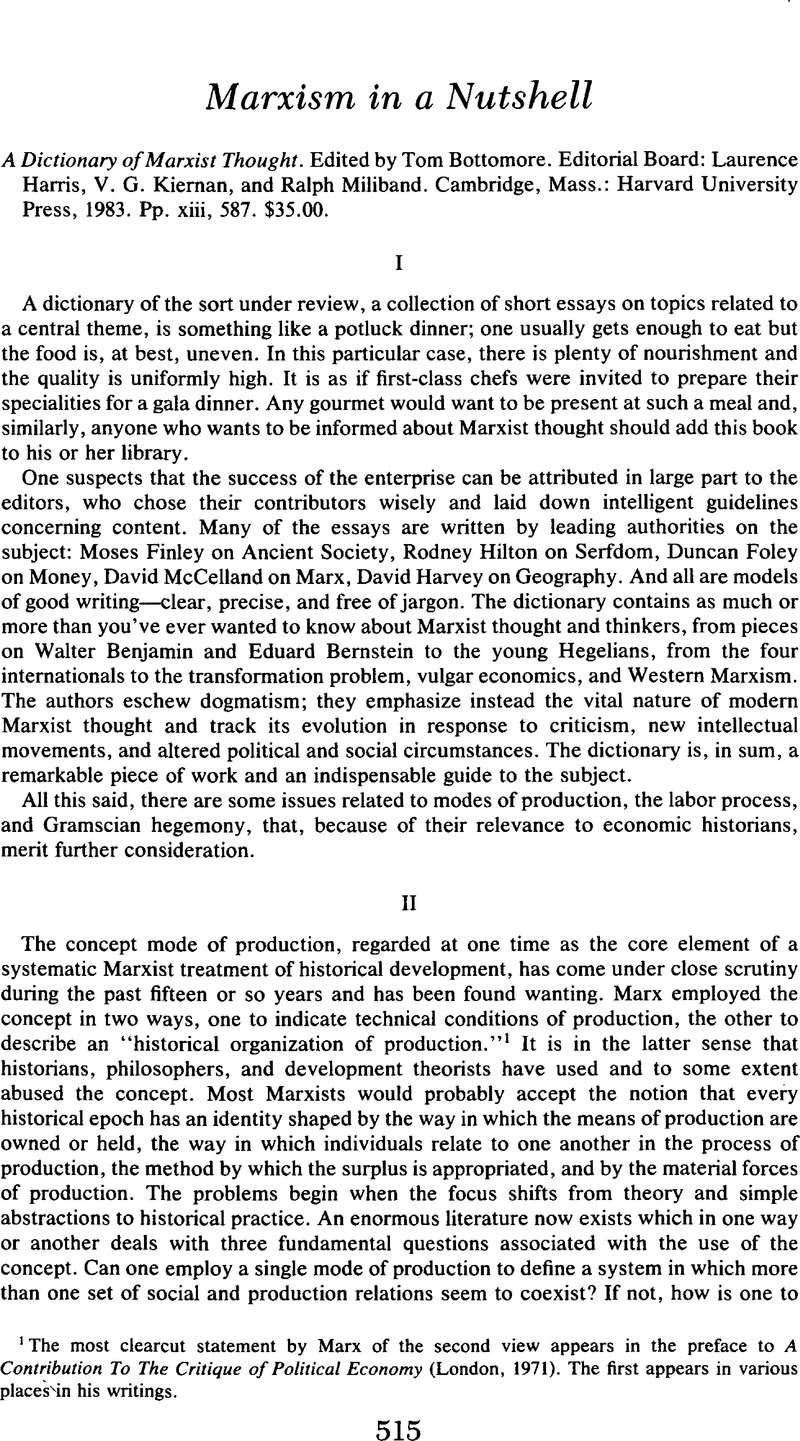No CrossRef data available.
Published online by Cambridge University Press: 03 March 2009

1 The most clearcut statement by Marx, of the second view appears in the preface to A Contribution To The Critique of Political Economy (London, 1971). The first appears in various places in his writings.Google Scholar
2 Althusser, Louis and Balibar, Etienne, Reading Capital (London, 1975).Google Scholar
3 Frank, André Gunder, Capitalism and Underdevelopment in Latin America (New York), 1969;Google ScholarWallerstein, Immanuel, The Origins of The Modern World-System (New York, 1974).Google Scholar For a blistering critique of these analyses see Brenner, Robert, “The Origins of Capitalist Development: A Critique of Neo-Smithian Marxism,” New Left Review, 104 (07–08. 1977).Google Scholar For a moderate assessment see Foster-Carter, Aidan, “The Modes of Production Controversy,” New Left Review, 107 (01-02. 1978).Google Scholar
4 Rey, Pierre-Philippe, Les Alliances des Classes (Paris, 1973);Google ScholarBanaji, Jairus, “Modes of Production in a Materialist Conception of History,” Capital and Class, 2 (1977). See also Foster-Carter, “Modes of Production Controversy.”Google Scholar
5 Cohen, G. M., Marx's Theory of History: A Defense (Princeton, 1978).Google Scholar
6 Among others, Levine, Andrew and Wright, Erik Olin, “Rationality and Class Struggle,” New Left Review, 123 (09.–10. 1980);Google Scholar and Miller, Richard W., “Producing Change: Work, Technology, and Power in Marx's Theory of History,” in Ball, Terence and Farr, James, eds., After Marx (New York, 1984).Google Scholar
7 Brenner, Robert, “Agrarian Class Structure and Economic Development in Preindustrial Europe,” Past and Present, 70 (1976)CrossRefGoogle Scholar and “The Origins of Capitalist Development”; Levine and Wright, “Rationality and Class Struggle.” Maurice Dobb, of course, subscribed to this view; see his Studies In The Development of Capitalism (London, 1963).Google Scholar
8 Braverman, Harry, Labor and Monopoly Capital (New York, 1974).Google Scholar
9 Marglin, Stephen, “What Do Bosses Do?” Review of Radical Political Economy, Part I, 6 (Summer 1974) and Part II, 7 (Spring 1975).CrossRefGoogle Scholar
10 Gordon, David, “Capitalist Efficiency and Socialist Efficiency,” Monthly Review, 28 (07–08. 1976);CrossRefGoogle ScholarBowles, Samuel, “The Production Process in a Competitive Economy: Walrasian, Neo-Hobbesian, and Marxian Models,” American Economic Review, 75 (03 1985).Google Scholar
11 Gintis, Herbert, “The Nature of the Labor Exchange,” Review of Radical Political Economics, 8 (Summer 1976).CrossRefGoogle ScholarGordon, David, Edwards, Richard, and Reich, Michael, Segmented Work, Divided Workers: The Historical Transformation of Labor in the United States (New York, 1982).Google Scholar
12 Bowles, “The Production Process in a Competitive Economy”; Roemer, John, “Divide and Conquer: Micro Foundations of the Marxian Theory of Discrimination,” Bell Journal of Economics, 10 (Autumn 1979);CrossRefGoogle ScholarReich, Michael, Racial Inequality: A Political-Economics Analysis (Princeton, 1981).CrossRefGoogle Scholar
13 It may be significant that most of this criticism has come from European Marxists where the working class is better organized and more political than in the United States. See, for example, the review article by Coombs, Rod, “Labour and Monopoly Capital,” New Left Review, 107 (01.–02. 1978).Google Scholar
14 See for example, Lazonick, William, “Production Relations, Labor Productivity, and Choice of Technique,” this JOURNAL, 41 (09. 1981).Google Scholar
15 Edwards makes a similar argument in an earlier work. See Edwards, Richard, Contested Terrain, The Transformation of the Workplace in the Twentieth Century (New York, 1979).Google Scholar
16 Gramsci, Antonio, Il Risorgimento (Rome, 1971).Google Scholar
17 Sereni, Emilio, Capitalismo e Mercato Nazionale (Rome, 1966);Google Scholar Renato Zangheri, “Problemi Storiografici ” in Gramsci, Istituto, Agricoltura e Sviluppo del Capitalismo (Rome, 1970)Google Scholar and, by the same author, “I rapporti stonci tra progresso agricolo e sviluppo economico in Italia,” in Mori, Giorgio. ed., L'Industrializzazione in Italia (1861–1900) (2nd ed., Bologna, 1981).Google Scholar
18 Romeo, Rosario, Risorgimento e Capitalismo (2nd ed., Bari, 1963).Google Scholar
19 Tosi, Dario, “Sulle forme iniziali di sviluppo economico e i loro effetti nel lungo periodo: la formazione di un'economia dualistica,” in Caracciolo, Albert, ed., La Formazione dell' Italia Industriale (Bari, 1963).Google Scholar